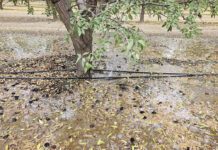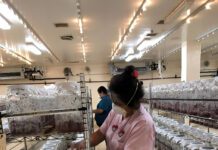
America’s forests are facing an unprecedented crisis, and the consequences extend far beyond the trees. Researchers at Colorado State University have uncovered a disturbing reality: Colorado’s forests now emit more carbon than they absorb.
Forests have long been our natural allies in the battle against climate change, capturing carbon dioxide and stabilizing ecosystems. However, invasive pests threaten this delicate balance. One of the main culprits? Beetles. These small but destructive insects are killing trees at an alarming rate, causing massive tree die-offs that release stored carbon into the atmosphere, accelerating climate change and reshaping entire ecosystems.
California is facing its battle with the goldspotted oak borer. This invasive beetle has already destroyed over 80,000 trees in San Diego County and is now moving north, threatening 600,000 oak trees in Santa Monica and beyond. Without intervention, these infestations will keep spreading, resulting in a landscape of dead trees, heightened fire risks, reduced air quality and weakened ecosystems.
In addition to the goldspotted oak borer, California also seems to be losing the battle against a range of beetles that are devastating our forests. These include the Douglas-fir beetle, cedar bark beetle and Jeffrey pine beetle, which are destroying vast acreages of trees and other foliage in our parks and neighborhoods.
The devastation caused by these pests is not inevitable, provided we have the right tools to combat them. Pesticides play a critical role in pest management, giving growers, forest managers and local agencies the ability to control infestations before they reach catastrophic levels.
Unfortunately, increasing regulatory restrictions threaten access to these essential solutions, leaving communities with fewer options to protect their forests, crops and homes.
Without effective pesticides, invasive pests will continue to devastate our natural resources. The consequences extend far beyond the loss of trees. Deforestation leads to higher temperatures, habitat destruction and increased wildfire risks. Dead trees act as significant fuel for wildfires, which are already becoming more intense each year. As communities build closer to these forests, as we’ve seen, the risk to property, human lives and animal welfare intensifies.
Wildfires have not only devastated communities but also swept through agricultural areas, destroying orchards, vineyards and other crops. They push various types of pests, like rodents looking for new habitats, onto farms and into communities. This increases the need for the use of pesticides and rodenticides to manage the pests from the affected forests in these new habitats. Researchers at Stanford University have found wildfire smoke is about 10 times more toxic than the typical air pollution from burning fossil fuels. Stanford experts state the more we breathe, the worse the range of health outcomes becomes.
This issue affects not only communities in general but also farm workers, who may be exposed while engaged in farming activities, as well as our most vulnerable population groups: the elderly and children.
To tackle this crisis, we must prioritize proactive pest management. This involves ensuring pesticides remain accessible as a frontline defense against invasive species. State and federal policymakers should avoid impulsive restrictions on pest control solutions and instead concentrate on science-based regulations that permit responsible and effective use.
Anti-pesticide activists constantly argue against pesticide use but then look away at the consequences of unchecked pest infestations. The reality is that without effective pest control, we risk losing entire forests, fueling climate change and endangering communities.
As the goldspotted oak borer advances north to Oregon, California faces a slow-moving environmental disaster, one that will only worsen if we fail to act. Providing access to pesticides is not only about protecting trees; it’s about safeguarding our environment, economy and future.
If we do not act now, we risk seeing our forests disappear, our air quality decline and our communities suffer the consequences. The time for action is now.
References
Colorado Article: https://www.cbsnews.com/colorado/news/colorados- forest-carbon-csu- researchers/?utm_source=flipboard&utm_content=user/CBSNews
Goldspotted oak borer: https://www.latimes.com/environment/story/2024- 05-28/gold-spotted-oak-borer-santa-monica-mountains
Goldspotted oak borer: https://abc7.com/post/invasive-beetle-killed- 80000-oak-trees-socal/14888105/
Goldspotted oak borer: https://cnas.ucr.edu/media/2024/05/29/invasive- insect-continues-its-spread-across-socal-killing-more-80000-oak-trees-so
Goldspotted oak borer: https://www.dailynews.com/2024/05/07/the-race- is-on-to-stop-a-tiny-pest-from-killing-southern-californias-native-oak-trees/
Health Effects of Wildfires: https://news.stanford.edu/stories/2025/01/- assessing-wildfire-health-risks















